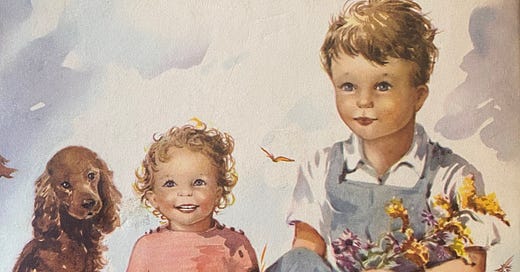The most remarkable thing happened a few weeks ago. If you have been following along, it is similar to when I found my journal from my first two weeks of college. I am forever finding the clues my younger selves stowed away for when it would be possible to process my story. This time, it was about who I decided to become as a very young child.
Several years ago—at least fifteen—I bought the book in the picture at an antique store. I displayed it in my office until I retired and rediscovered it when we moved into the cottage. I carried it with me during five moves before finally picking it up and reading. I immediately knew that my younger self had read the book.
My first discovery was a section that confused me as a child (more on that another time). Once that was processed it was possible to see the positive impact of the book and how pivotal it was to my faith. This book provided an understanding of who Jesus was that held my faith steady for a lifetime.
I have wondered why being like Jesus—something that seemed so clear and simple to me—suddenly no longer seems like a priority to so many. Were the WWJD (What Would Jesus Do) armbands just too cliché and simple—or maybe too difficult? Is that where we lost the plot? Did we get so used to the armband—or phrase—that it became easy to forget what it meant?
Why did being like Jesus seem so simple to me? As I read the words in the book, I understood. My younger self was taught that it really was simple. The book was written as conversations between a boy and his parents. Here is one example of the wisdom the father shared and I apparently absorbed as a child:
“One day Jesus was talking with his friends . . . He was telling them how they could show they they loved him. ‘Whenever you are good to anybody who needs your help, . . . you are showing love to me.’ You see, what Jesus wants most of all is for people to love one another and help one another.”
Is it that simple? Is helping one another what love looks like? Does it apply to everyone? The entire book is a beautiful portrayal that the answer to all these questions is yes—with one important understanding.
Jesus loved those without power while holding the powerful religious leaders accountable. Did he love them? he asked for them to be forgiven when they killed him, so that seems like evidence. He forgave even knowing the religious leaders had forced the hand of the government to bring about his death. He also forgave those who really didn’t know what they were doing.
There were so many ways that Jesus could have ended the story differently, but love does not involve force. Jesus never forced anyone to do anything. When his disciple tried to settle things with a sword, he said, “Put your sword back in its place, for all who draw the sword will die by the sword.” (Matthew 56:22 NIV) He made it clear that he was not mounting a rebellion.
I think some have taken the words of Jesus and turned them into a battle cry—as if it is good to be harmed (die by the sword) when defending Jesus. No! Jesus said that this was not how it worked. He then showed how to love by healing the servant’s ear that had been lopped off. Jesus was always demonstrating how to love.
You don’t get to be a true follower of Jesus and not love everyone. We may have lost the plot on this because Jesus didn’t ask us to judge and control. Jesus asked us to love. I knew that at eight years of age. I built my life on the belief that whatever I did should align with who Jesus was. Sometimes I failed, but finding this book shows me that it really was simple enough for a child to understand. The book reminded me that I always understood what it meant to be like Jesus.
Sometimes I wonder if love can win. I feel so fortunate that I was able to pause and remember what it was to be a small child who believed that it was possible to be like Jesus by loving others—all others. I disagree with many people right now and that is my prerogative. The question is, "Can I still love?"
Loving is harder when I disagree, but remembering and embracing my simple—powerless but powerful—childhood faith keeps me on the path that Jesus said would bring the kingdom to earth.
He called a little child to him, and placed the child among them. And he said: “Truly I tell you, unless you change and become like little children, you will never enter the kingdom of heaven. Therefore, whoever takes the lowly position of this child is the greatest in the kingdom of heaven. And whoever welcomes one such child in my name welcomes me.
(Matthew 18: 2-5 NIV)





Just out of curiosity… do you have a definition of love? The topic of love is my husband’s favourite and he is writing a book on it. He loves hearing other people’s definitions (and thoughts) on it.
Love this! It inspired a clarification of my current work, what I call Core Life Formation Practice, as I walk people who have been been traumatized "in the pews" and so don't really know who they are or who God is... going back to do the challenging but gloriously rewarding work of allowing God to re-parent us. Thanks for the flash of inspiration 💜🙏😇 ... I wrote for over 90 minutes 😎😉